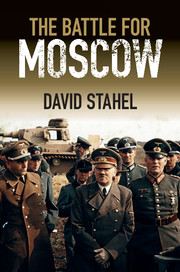Book contents
- Frontmatter
- Contents
- List of illustrations
- List of maps
- List of table
- Acknowledgements
- Glossary
- Tables of military ranks and army structures
- Introduction
- 1 Parallel wars
- 2 The idle Typhoon
- 3 Preparing the final showdown
- 4 The Orsha conference
- 5 Typhoon re-launched
- 6 The long road to Moscow
- 7 Victory at any price
- 8 The frozen offensive
- 9 Down to the wire
- 10 To the gates of Moscow
- Conclusion
- Notes
- Bibliography
- Index
7 - Victory at any price
Published online by Cambridge University Press: 05 February 2015
- Frontmatter
- Contents
- List of illustrations
- List of maps
- List of table
- Acknowledgements
- Glossary
- Tables of military ranks and army structures
- Introduction
- 1 Parallel wars
- 2 The idle Typhoon
- 3 Preparing the final showdown
- 4 The Orsha conference
- 5 Typhoon re-launched
- 6 The long road to Moscow
- 7 Victory at any price
- 8 The frozen offensive
- 9 Down to the wire
- 10 To the gates of Moscow
- Conclusion
- Notes
- Bibliography
- Index
Summary
‘More murder than war’: the battle against Soviet civilians
As the German advance to Moscow continued one step at a time, the men of Army Group Centre were left exposed to the freezing temperatures, often for days on end. This took its own toll on the fighting units as sickness spread and cases of frostbite became more and more common. By 21 November, Halder had been informed that there were now more German soldiers being treated for illnesses than for wounds. Even this grim statistic was presented with a positive spin in Halder’s dairy, when he observed that the current 1:1.4 ratio of wounded to sick was better than previous wars where the ratio had been 1:4. Eric Kern referred to the long nights in Russia as being ‘indescribable’, and noted that he and his comrades had neither winter coats nor gloves. ‘We lay in the Russian trenches, our heads scantily covered with tarpaulins stiff with ice, while outside a howling blizzard drove great waves of powdered snow before it. Many froze to death.’ Another German soldier wrote home to his family on 21 November that he was lying outside in his foxhole roughly 80 km north of Moscow with feet that were already half frozen. At the same time, Siegfried Knappe observed: ‘The snow blew almost horizontally in blizzards that sometimes lasted all day long, with the wind piercing our faces with a thousand needles … We reduced sentry duty to one hour, then to thirty minutes, and finally to fifteen minutes. The cold was quite simply a killer; we were all in danger of freezing to death.’
- Type
- Chapter
- Information
- The Battle for Moscow , pp. 202 - 231Publisher: Cambridge University PressPrint publication year: 2015



